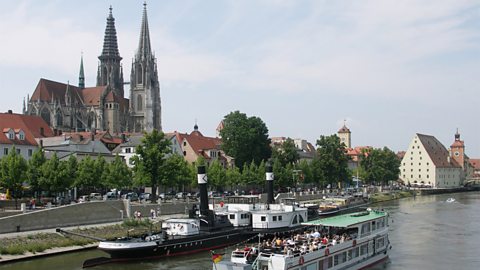Compound nouns
The German language is full of compound nouns. A compound noun involves joining a number of nouns together to create a new word, eg meine Lieblingsfußballmannschaft means 'my favourite football team'. It includes three different nouns to create one word:
Lieblings (favourite) + Fußball (football) + Mannschaft (team)
Compound nouns are very descriptive and can be created in a number of different ways:
| Noun + noun | Kinderbuch | children’s book |
| Adjective + noun | Großstadt | big town/city |
| Noun + adjective | schneeweiß | snow white |
| Verb stem + noun | Kaufpreis | purchase price |
| Preposition + noun | Vorname | forename/first name |
| Preposition + verb | durchgehen | to go through/to pass through |
| Adjective + adjective | dunkelgrün | dark green |
| Noun + noun |
|---|
| Kinderbuch |
| children’s book |
| Adjective + noun |
|---|
| Großstadt |
| big town/city |
| Noun + adjective |
|---|
| schneeweiß |
| snow white |
| Verb stem + noun |
|---|
| Kaufpreis |
| purchase price |
| Preposition + noun |
|---|
| Vorname |
| forename/first name |
| Preposition + verb |
|---|
| durchgehen |
| to go through/to pass through |
| Adjective + adjective |
|---|
| dunkelgrün |
| dark green |
The gender of a compound noun is always determined by the last word:
- das Kinderbuch – das Buch
- die Großstadt – die Stadt
- der Kaufpreis – der Preis
- der Vorname – der Name
Question
See if you can guess what the following compound nouns mean.
- der Ohrwurm
- die Fernbedienung
- der Zungenbrecher
- die Schlagzeuge
- der Arbeitsgeber
- ein Handschuhschneeballwerfer
- die Geschwindigkeitsbegrenzung
- der Tierarzt
- die Zahnfleischentzündung
- der Fußbodenschleifmaschinenverleih
| Compound | Meaning |
| der Ohrwurm (ear + worm) | a catchy song stuck in your head |
| die Fernbedienung (TV + service) | TV remote control |
| der Zungenbrecher (Tongue + breaker) | tongue twister |
| die Schlagzeuge (Hit + things) | drums |
| der Arbeitsgeber (Work + giver) | employer |
| ein Handschuhschneeballwerfer (Glove + snowball + ball + thrower) | a coward, literally someone who has to wear gloves to throw snowballs! |
| die Geschwindigkeitsbegrenzung (Speed + limit) | speed limit |
| der Tierarzt (animal + doctor) | vet |
| die Zahnfleischentzündung (Tooth + flesh + inflammation) | gum infection |
| ein Wolkenkratzer (cloud + scratcher) | a skyscraper |
| Compound | der Ohrwurm (ear + worm) |
|---|---|
| Meaning | a catchy song stuck in your head |
| Compound | die Fernbedienung (TV + service) |
|---|---|
| Meaning | TV remote control |
| Compound | der Zungenbrecher (Tongue + breaker) |
|---|---|
| Meaning | tongue twister |
| Compound | die Schlagzeuge (Hit + things) |
|---|---|
| Meaning | drums |
| Compound | der Arbeitsgeber (Work + giver) |
|---|---|
| Meaning | employer |
| Compound | ein Handschuhschneeballwerfer (Glove + snowball + ball + thrower) |
|---|---|
| Meaning | a coward, literally someone who has to wear gloves to throw snowballs! |
| Compound | die Geschwindigkeitsbegrenzung (Speed + limit) |
|---|---|
| Meaning | speed limit |
| Compound | der Tierarzt (animal + doctor) |
|---|---|
| Meaning | vet |
| Compound | die Zahnfleischentzündung (Tooth + flesh + inflammation) |
|---|---|
| Meaning | gum infection |
| Compound | ein Wolkenkratzer (cloud + scratcher) |
|---|---|
| Meaning | a skyscraper |
False friends
'False friends' are words in one language that look like words in another language, but which have very different meanings.
There are a number of false friends in German, where the words look identical or are very similar to English ones. Be careful not to mix up the meaning.
Question
Look at the following nouns and try to translate them:
- das Gift
- das Bad
- der Chef
- eine Dose
- eine Fabrik
- die Marmelade
- das Gift – poison. ein Geschenk is the German word for a present or a gift
- das Bad – bath/spa. schlecht is the German word for bad
- der Chef – boss. der Koch is the German word for a cook or a chef
- eine Dose – can/tin. eine Dosis is the German word for a dose
- eine Fabrik – factory. der Stoff is the German word for fabric or material
- die Marmelade – jam. Orangenmarmelade would specifically refer to jam with orange peel in it, typically known as just marmalade in English
Did you know?
The German language lost its longest word in 2013.
Rindfleischetikettierungsüberwachungsaufgabenübertragungsgesetz (commonly abbreviated to RkReÜAÜG) meaning the ‘law delegating beef label monitoring’ is made up of seven different nouns all joined together.
The word was first created in 1999 as a result of the BSE (Mad Cow Disease) crisis – Rinderwahnsinn – but changes to the European Law regarding the testing of cattle meant that the word was no longer needed.
Another famous compound noun is Donaudampfschifffahrtsgesellschaftskapitän, which means 'Danube steamship company captain'. Some people enjoy playing word games to create new, even longer compound nouns such as Donaudampfschifffahrtsgesellschaftskapitänswitwe – the Danube steamship company captain's widow and Donaudampfschifffahrtskapitänsjacke – the captain's jacket.
At 80 letters in total, the word Donaudampfschifffahrtselektrizitätenhauptbetriebswerkbauunterbeamtengesellschaft, which means 'Association for subordinate officials of the head office management of the Danube steamboat electrical services' is quite a Zungenbrecher (tongue twister).
John Humphrys talks about the loss of Germany's longest word
